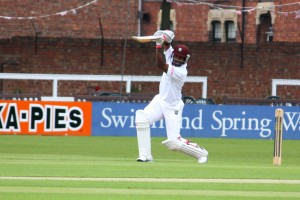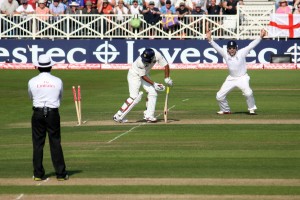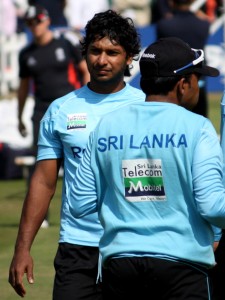Greig wades in
Wednesday, June 27th, 2012In terms of eloquence, it was never going to match Kumar Sangakkara’s wonderful tour de force last year, but Tony Greig’s Spirit of Cricket Cowdrey Lecture certainly pulled no punches when it came to India and its influence on the world game.
In a room filled with cricket’s great and good and redolent with the smell of smoke from burning bridges by the end of it, Greig’s forty-minute speech used the word “India” fifty-two times in total as he took the BCCI to task for its self-interest and greed and for pursuing a policy bent purely on the maintenance of power and of getting one over on its erstwhile colonial oppressors.
“India is preoccupied with money and Twenty-20 cricket, and sees its IPL and Champions League as more important than a proper international calendar,” he said. “To compound the problems, India has not only sold part of the game to private interests but some of her administrators are seen to have a conflict of interest, which makes it more difficult for it to act in the spirit of the game… The net result of this is Test cricket is suffering… We can huff and puff as much as we like and have all sorts of external reports but this situation can only be resolved by India accepting that the spirit of cricket is more important than generating billions of dollars.”
Strong stuff, but after the initial collective thud of jaws dropping you got the feeling there may have been one or two heads in the room nodding in agreement.
He also took aim at the BCCI’s resistance to umpiring technology, its “indifference” towards anti-doping and corruption and problems which “could be resolved if India invoked the spirit of cricket and didn’t try and influence its allies in how to vote”.
Greig, of course, isn’t the first to criticise the Indian board for its selfish lack of interest in the wellbeing of the sport – Lawrence Booth issued a reminder to the BCCI not to abuse its “special gift: the clout to shape an entire sport” in his notes to this year’s Wisden Almanack – but no-one does “damn the torpedoes” quite like Tony Greig, and whether he will ever be invited back to India for a commentary stint in the future is anyone’s guess. You might think it, but Tony will damn well say it, and let’s be honest, many of us agree with him that India’s control of the sport at the highest level is deleteriously disproportionate.
Having said that, there is something slightly incongruous about a man taking a cricket board to task for its blatant commercialism, and the damage caused by government interference in the sport, when, as “tourism ambassador” for Sri Lanka, he managed to shoehorn a thinly-disguised advert for a hotel into his commentary during England’s recent Test series there. He also, unfortunately, joins the ranks of those bamboozled by bullshit and bad science in dragging up that long-discredited old chestnut of lie-detector tests to root out corruption. That and the fact that Greig – the man who was involved in the notorious 1974 runout of Alvin Kallicharran – was the man delivering the speech, and Stuart Broad – a man who thinks every lbw he goes up for is out, and when he is batting he never is – was involved in the panel discussion afterwards, might have made you do a double-take on seeing their names attached to a “spirit of cricket” lecture.
Anyway, whether or not you agree with what Tony Greig had to say, his speech was certainly not dull, and you can read the full transcript at the Lord’s site.
===
And so we come to that part of the year when students the length and breadth of the country are goggle-eyed through too much revision and Red Bull, and the “mid term report” metaphor gets trundled out and applied to England’s performance halfway through the international summer. The consensus seems to be Team England haven’t just performed with flying colours so far, but are on course for an A+ grade by season’s end.
Let’s not get carried away. The West Indies series was less a prelim than an open-book exam; for all our fervent hopes that the Windies would present England with some semblance of a challenge – and that’s not being patronizing though it’s easy of course to be magnanimous when you’re winning – a competition never really materialized. Comprehensive victories by England were expected in the Tests, but less so in the ODIs and certainly the T20 match last Sunday was expected to provide a more level playing field, but only served to highlight the Windies’ frailties. Last time the West Indies visited England it was Shiv Chanderpaul who was the side’s star; this time around Marlon Samuels won cult hero status – that doughty, crease-occupying 76* at Trent Bridge showed how much he has matured as a Test batsman. Tino Best provided some entertainment as well, and you’d have needed a heart of stone not to feel for him when at Edgbaston he fell just 5 runs short of the first century by a no. 11 batsman. But the team never really clicked as a unit, and in the case of offspinner Sunil Narine, preceded by a large amount of hype on the back of 24 wickets in the IPL, there was only disappointment and a distinct lack of the “mystery spin” we were promised, though conditions weren’t exactly beneficial for him.
It’s infuriating when there’s a missing ingredient that stops true potential from coming to fruition and producing success, but from a Leicestershire fan’s point of view it was nice to get a glimpse of that potential when the Windies played a tour match at Grace Road and Darren Bravo, who never really fired in the Tests but made 66 against Leicestershire, gave all of us watching a reminder of the beautiful strokeplay that brings out those Brian Lara comparisons.
England now face Australia in a series of five ODIs, starting on Friday, and while Bill Lawry might be taking things a bit far in trumpeting Australia’s seam bowling attack as the best in the world, they’re sure to provide a far stiffer examination, and better preparation for facing a South African squad that looks, quite frankly, intimidating in its strength and depth.
===
I’m aware that this post is starting to resemble a smorgasbord, or a salmagundi if you will (hodgepodge if you want to be less charitable) but it’s a been a mixed fortnight in terms of cricket news, from the tragic (the passing of Tom Maynard) to the ridiculous (Andrew Flintoff’s reference to Mike Atherton as a “fucking prick”) and the downright predictable (yet another kiboshing by the BCCI of a move at ICC Board level to make the decision review system mandatory across the board).
Tom Maynard’s sad death deserves more than just a footnote, but as yet it’s hard to make sense of the sequence of catastrophic events that led to a talented young cricketer being hit by an underground train in the early hours of Monday, June 18th. What made the news harder to take in was the fact he’d only been on television a couple of days before, talking about a future which he was hoping would involve playing for England.
Last week I wrote my own tribute to another bright light that was snuffed out too soon for World Cricket Watch on my favourite cricketer, Victor Trumper. Trumper accomplished much in his short life before he was taken by illness at the age of 37. With Tom Maynard, only 23, we will never know what he could have gone on to achieve. We like to believe that life, most of the time, and discounting the odd random variable, is something we can more or less control. But when events like this happen, everything we think we know about the natural order of things is thrown into chaos; death becomes, in the words of writer Edward St. Aubyn, “a scandal, a catastrophic design flaw; it ruins everything”.
Rest in peace, Tom.



